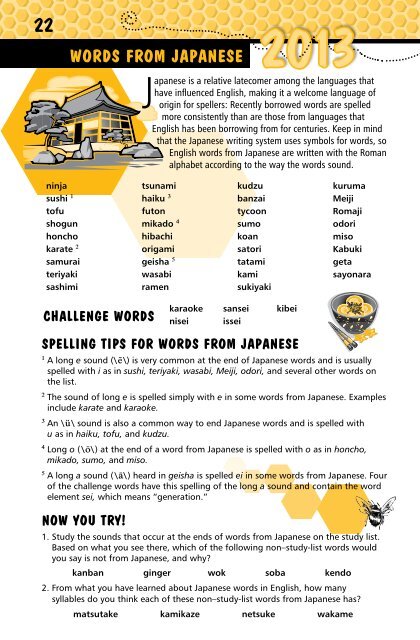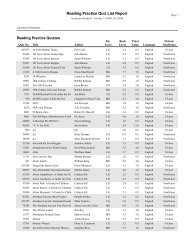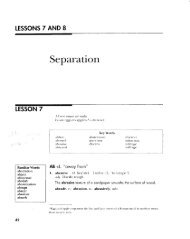Spell It!
Spell It!
Spell It!
You also want an ePaper? Increase the reach of your titles
YUMPU automatically turns print PDFs into web optimized ePapers that Google loves.
22<br />
ninja<br />
sushi 1<br />
tofu<br />
shogun<br />
honcho<br />
karate 2<br />
samurai<br />
teriyaki<br />
sashimi<br />
2013 Japanese is a relative latecomer among the languages that<br />
have influenced English, making it a welcome language of<br />
origin for spellers: Recently borrowed words are spelled<br />
more consistently than are those from languages that<br />
English has been borrowing from for centuries. Keep in mind<br />
that the Japanese writing system uses symbols for words, so<br />
English words from Japanese are written with the Roman<br />
alphabet according to the way the words sound.<br />
WordS from jApAneSe<br />
chALLenGe WordS<br />
tsunami<br />
haiku 3<br />
futon<br />
mikado 4<br />
hibachi<br />
origami<br />
geisha 5<br />
wasabi<br />
ramen<br />
karaoke<br />
nisei<br />
sansei<br />
issei<br />
kudzu<br />
banzai<br />
tycoon<br />
sumo<br />
koan<br />
satori<br />
tatami<br />
kami<br />
sukiyaki<br />
kibei<br />
SpeLLInG tIpS for WordS from jApAneSe<br />
kuruma<br />
Meiji<br />
Romaji<br />
odori<br />
miso<br />
Kabuki<br />
geta<br />
sayonara<br />
1 A long e sound (\\) is very common at the end of Japanese words and is usually<br />
spelled with i as in sushi, teriyaki, wasabi, Meiji, odori, and several other words on<br />
the list.<br />
2 The sound of long e is spelled simply with e in some words from Japanese. Examples<br />
include karate and karaoke.<br />
3 An \\ sound is also a common way to end Japanese words and is spelled with<br />
u as in haiku, tofu, and kudzu.<br />
4 Long o (\\) at the end of a word from Japanese is spelled with o as in honcho,<br />
mikado, sumo, and miso.<br />
5 A long a sound (\\) heard in geisha is spelled ei in some words from Japanese. Four<br />
of the challenge words have this spelling of the long a sound and contain the word<br />
element sei, which means “generation.”<br />
noW You trY!<br />
1. Study the sounds that occur at the ends of words from Japanese on the study list.<br />
Based on what you see there, which of the following non–study-list words would<br />
you say is not from Japanese, and why?<br />
kanban ginger wok soba kendo<br />
2. From what you have learned about Japanese words in English, how many<br />
syllables do you think each of these non–study-list words from Japanese has?<br />
matsutake kamikaze netsuke wakame<br />
All the words on this list are related to words that were used<br />
2500 years ago! English gets an important part of its<br />
vocabulary from the language of ancient Greece. Classical<br />
Greek, as it is called, is quite different from but closely related<br />
to the language spoken in Greece today. The ancient Greeks<br />
provided the foundation for many important ways of looking<br />
at the world and for living in society that are still important<br />
today; that is one reason their language has remained so<br />
influential. <strong>It</strong> is still used today, for example, when scientists<br />
need a word to describe something newly created or discovered.<br />
lethargy<br />
android<br />
chronic<br />
biopsy<br />
irony<br />
automaton<br />
enthusiasm<br />
synopsis<br />
homogeneous<br />
odyssey<br />
megalopolis<br />
acme 1<br />
synonym<br />
orthodox<br />
aristocracy<br />
calypso<br />
patriarch<br />
hierarchy<br />
character 2<br />
isobar<br />
asterisk<br />
eclectic<br />
melancholy<br />
stoic<br />
chronology<br />
eulogy<br />
didactic<br />
cosmetic<br />
Spartan<br />
geothermal<br />
cynical 3<br />
homonym<br />
cryptic<br />
hypothesis<br />
academy<br />
pentathlon<br />
antibiotic<br />
diatribe<br />
etymology<br />
hydraulic 4<br />
trauma<br />
hygiene<br />
semantics<br />
thesaurus<br />
phenomenon 5<br />
cosmos<br />
protagonist<br />
acronym<br />
paradox<br />
synchronous<br />
misanthropy<br />
sarcasm<br />
ephemeral<br />
polygon<br />
nemesis<br />
syntax<br />
eureka<br />
topography<br />
WordS from Greek<br />
panic<br />
apostrophe<br />
geranium<br />
metaphor<br />
spherical<br />
xylophone 6<br />
dynamic<br />
myriad<br />
epiphany<br />
apathy<br />
synergy<br />
amnesia<br />
philanthropy<br />
democracy<br />
strategy 7<br />
diagnosis<br />
topical<br />
matriarch<br />
endemic<br />
analysis 8<br />
protocol<br />
tragic<br />
hydrology<br />
polymer<br />
notochord<br />
biblical<br />
ergonomic<br />
mathematics<br />
tachometer<br />
protein<br />
rhinoceros<br />
hyphen<br />
autopsy<br />
pyre<br />
herpetology<br />
angelic<br />
tritium<br />
androcentric<br />
demotic<br />
geode<br />
rhetoric<br />
hedonism<br />
eponym<br />
periscope<br />
agnostic<br />
geoponics<br />
dogma<br />
asthmogenic<br />
idiom<br />
monotonous<br />
thermal<br />
amphibious<br />
dyslexia<br />
symbiosis<br />
Olympian<br />
macron<br />
allegory<br />
periphery<br />
pragmatic<br />
adamant<br />
(For footnotes, see<br />
<strong>Spell</strong>ing Tips, pages 24–25.)<br />
23











